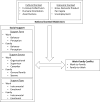A meta-analysis of work-family conflict and social support
- PMID: 29239632
- PMCID: PMC5858956
- DOI: 10.1037/bul0000120
A meta-analysis of work-family conflict and social support
Abstract
The relationship between social support and work-family conflict is well-established, but the notion that different forms, sources, and types of social support as well as contextual factors can alter this relationship has been relatively neglected. To address this limitation, the current study provides the most comprehensive and in-depth examination of the relationship between social support and work-family conflict to date. We conduct a meta-analysis based on 1021 effect sizes and 46 countries to dissect the social support and work-family conflict relationship. Using social support theory as a theoretical framework, we challenge the assumption that social support measures are interchangeable by comparing work/family support relationships with work-family conflict across different support forms (behavior, perceptions), sources (e.g., supervisor, coworker, spouse), types (instrumental, emotional), and national contexts (cultural values, economic factors). National context hypotheses use a strong inferences paradigm in which utility and value congruence theoretical perspectives are pitted against one another. Significant results concerning support source are in line with social support theory, indicating that broad sources of support are more strongly related to work-family conflict than are specific sources of support. In line with utility perspective from social support theory, culture and economic national context significantly moderate some of the relationships between work/family support and work interference with family, indicating that social support is most beneficial in contexts in which it is needed or perceived as useful. The results suggest that organizational support may be the most important source of support overall. (PsycINFO Database Record
(c) 2018 APA, all rights reserved).
Figures
References
Appendix B Studies Included in the Meta-Analysis
Studies Included in the Meta-Analysis
-
- Adams GA, King LA, King DW. Relationships of job and family involvement, family social support, and work-family conflict with job and life satisfaction. Journal of Applied Psychology. 1996;81:411–420. doi: 10.1037/0021-9010.81.4.411. - DOI
-
- Adkins CL, Premeaux SF. Spending time: The impact of hours worked on work-family conflict. Journal of Vocational Behavior. 2012;80:380–389. doi: 10.1016/j.jvb.2011.09.003. - DOI
-
- Agarwala T, Arizkuren-Eleta A, Del Castillo E, Muñiz-Ferrer M, Gartzia L. Influence of managerial support on work-life conflict and organizational commitment: An international comparison for India, Peru and Spain. The International Journal of Human Resource Management. 2014;25:1460–1483. doi: 10.1080/09585192.2013.870315. - DOI
-
- Allard K, Haas L, Hwang CP. Family-supportive organizational culture and fathers’ experiences of work-family conflict in Sweden. Gender, Work and Organization. 2011;18:141–157. doi: 10.1111/j.1468-0432.2010.00540.x. - DOI
-
- Anderson SE, Coffey BS, Byerly RT. Formal organizational initiatives and informal workplace practices: Links to work-family conflict and job-related outcomes. Journal of Management. 2002;28:787–810. doi: 10.1177/014920630202800605. - DOI
References
-
- Adams GA, King LA, King DW. Relationships of job and family involvement, family social support, and work–family conflict with job and life satisfaction. Journal of Applied Psychology. 1996;81:411–420.
-
- Agars MD, French KA. Underrepresented populations in work-family research. In: Allen TD, Eby LT, editors. The oxford handbook of work and family. New York: Oxford University Press; 2016. pp. 362–375.
-
- Allen TD. Family-supportive work environments: The role of organizational perceptions. Journal of Vocational Behavior. 2001;58:414–435.
-
- Allen TD, French KA, Dumani S, Shockley KM. Meta-analysis of work-family conflict mean differences: Does national context matter? Journal of Vocational Behavior. 2015;90:90–100.
-
- Allen TD, Herst DE, Bruck CS, Sutton M. Consequences associated with work-to-family conflict: A review and agenda for future research. Journal of Occupational Health Psychology. 2000;5:278–308. - PubMed
Publication types
MeSH terms
Grants and funding
LinkOut - more resources
Full Text Sources
Other Literature Sources
Medical



